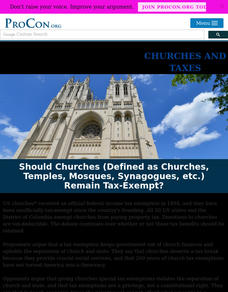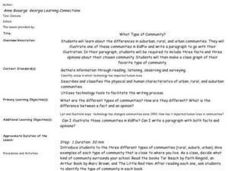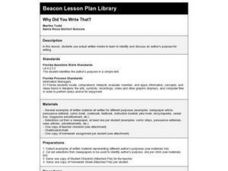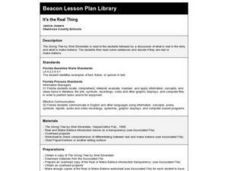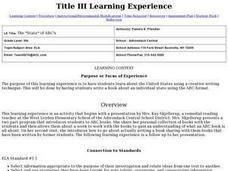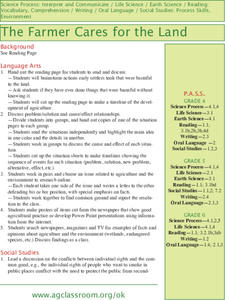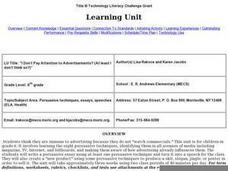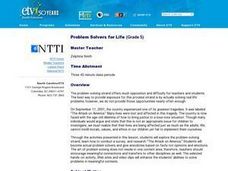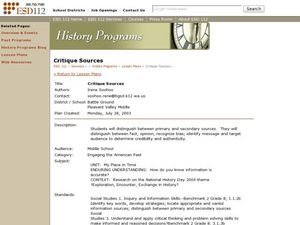Curated OER
Analytical Essay
What is an analytical essay? Introduce this type of thinking to your young writers. First, discuss what it means to analyze something. Then, identify the different components of an essay and what details are embedded in each component....
Curated OER
Inference Lesson Plan
Students practice assessing graphics to infer and identify an author's implicit and explicit meaning in a piece of text. They evaluate the effectiveness of information found in maps, charts, tables, graphs, diagrams, cutaways and through...
Achievement Strategies
CCSS Unpacked Learning Targets for Reading and Writing History/Social Studies
How do all the lessons and activities you have planned for your class align to Common Core State Standards? This can feel like a very daunting question. Help ease the process by referencing a template that not only lists and organizes...
Curated OER
The Adventures of Huckleberry Finn: Socratic Seminar
After reading The Adventures of Huckleberry Finn and an article about the use of the novel, class members engage in a Socratic seminar focused on whether or not Twain's book should be banned.
Curated OER
Churches and Taxes
Churches have been tax-exempt since the founding of America, but should they be? Pupils ponder the question as they browse the website in preparation for a class debate or discussion. They research the history of tax-exemption for...
Curated OER
Produce a Nonfiction Text
In this language arts worksheet, middle schoolers look for the facts and create several nonfiction texts while including useful information for the reader.
Curated OER
What Type of Community?
Students compare and contrast suburban, rural and urban communities. They read books such as The Little Red Hen and identify the type of community in each book. Using computer software, they write about each type of community and...
Curated OER
Cause and Effect
Students identify cause and effect relationships in a short story. After reading a short story, they participate in a discussion of how one event in a story can lead to several others. Students are then paired for a matching task that...
Curated OER
Speak Out!
Students consider their opinions on various topics and issues related to the terrorist attacks on the United States on September 11, 2001. Then, focusing on one specific topic, each student supports his or her opinions in a...
Curated OER
Pioneers Heading West
Young scholars brainstorm, analyze, compare and contrast,
and illustrate accomplishments of pioneers of the west. Students identify and interpret the Pacific Northwest pioneers. Young scholars present their final projects to the class...
Curated OER
Why Did You Write That?
Second graders use actual written media to identify and discuss an author's purpose for writing. They identify the author's purpose in a selection from the newspaper, and write a short description of how they came to their conclusion.
Curated OER
It's the Real Thing
Students listen to a read-aloud of Shel Silverstein's, The Giving Tree, identifying which parts of the story and which are make believe.
Curated OER
The "State" of ABC's
Fifth graders apply the ABC format to write books about various states. They identify important people, places, and events and include title. copyright, and dedication pages. They have items for all letters and createcovers and "about...
Curated OER
Examining newspapers
Students compare and contrast tabloid and broadsheet papers. In this journalism lesson plan, students examine how techniques and form differs from one type of publication to the other. The culminating activity is for students to take...
Pennsylvania Department of Education
Wind and Water Wheels
Students identify wind and water as natural resources that create energy. In this natural resources and energy use lesson, students work in groups to construct a pinwheel, then explore the effects of wind and water on the pinwheel....
Pennsylvania Department of Education
Pennsylvania’s Energy Supply
Third graders become familiar with the various types of energy and which types are found in Pennsylvania. In this Pennsylvanian energy resources lesson, 3rd graders, identify wind and water as sources of energy. Students complete an...
Curated OER
The Farmer Cares for the Land
Students identify cause and effect relationships in issues relating to agriculture and the environment.
Curated OER
Native American Unit
Third graders explore America's history prior to 1492. This unit of six lessons identifies five regions of the United States and assists students in the development of an understanding of the Native Americans who lived in the regions.
Curated OER
I Don't Pay Attention to Advertisements
Sixth graders examine the eight persuasive techniques, identifying them in all avenues of media including magazine, TV, Internet, and billboards, and making them aware of how advertising already influences them. They write an essay using...
Curated OER
Unknown Element Project
Students work with a partner to determine the identity of an unknown element based on given descriptions. Groups use classroom textbooks, encyclopedias, and science internet sites to identify their unknown element then write a report as...
Curated OER
Problem Solvers for Life
Fifth graders identify and explore the components of solving a problem. Students conduct a survey to collect, analyze and interpret data based on a given problem. Also, 5th graders use a variety of strategies to solve math problems,...
Curated OER
Evolving Views about Minority Rights in the United States
Tenth graders compare and contrast majority and minority outlooks on issues. In this social justice lesson, 10th graders research majority and minority values regarding the Salem Witch Trials, Plessy v. Ferguson, the McCarthy hearings,...
Curated OER
Critique Sources
Students distinguish between primary and secondary sources. They study about fact, opinion, and recognize bias. Students find out if information is accurate or not and report on it. For the final project students create an annotated...
Curated OER
Objective Versus Subjective
Young scholars examine the difference between subjective and objective statements, newscasts, and media. They discover that subjective is opinion based and objective is fact based.






